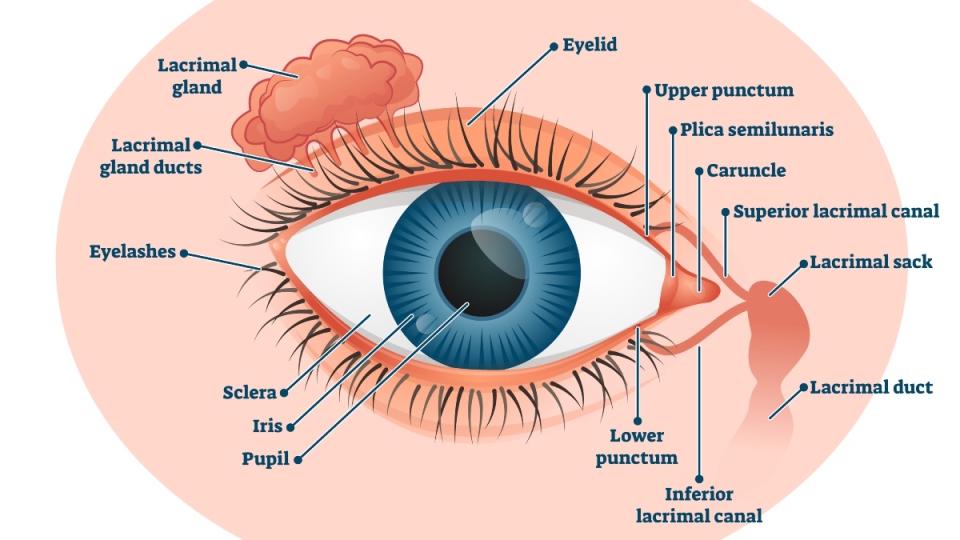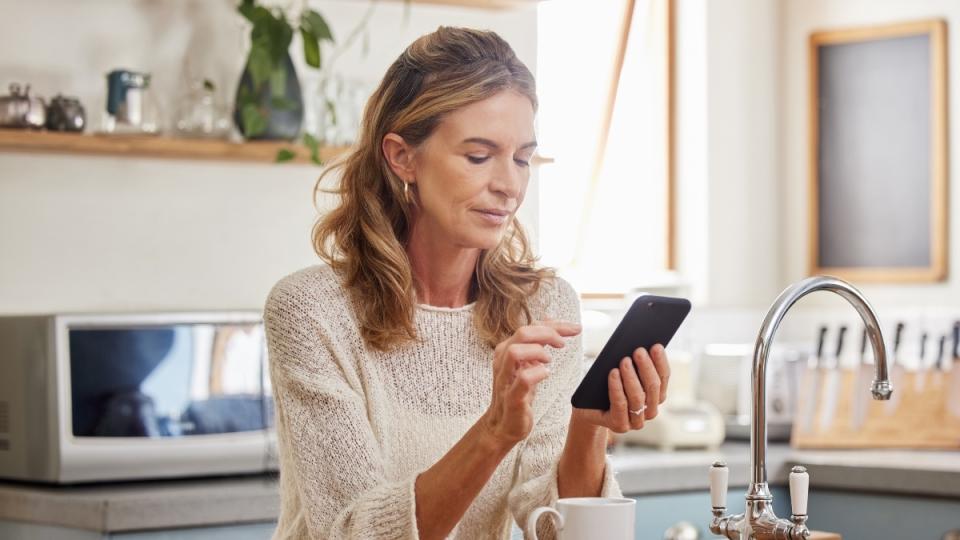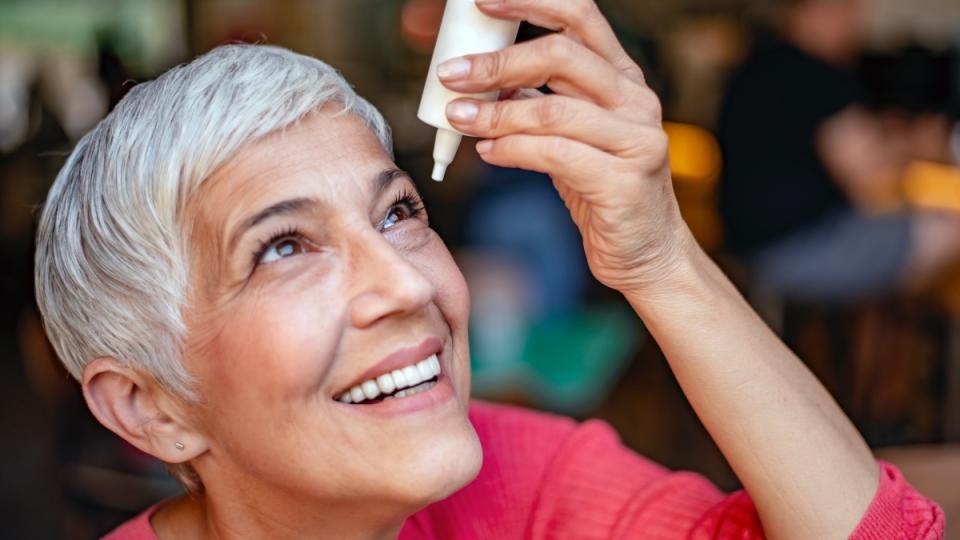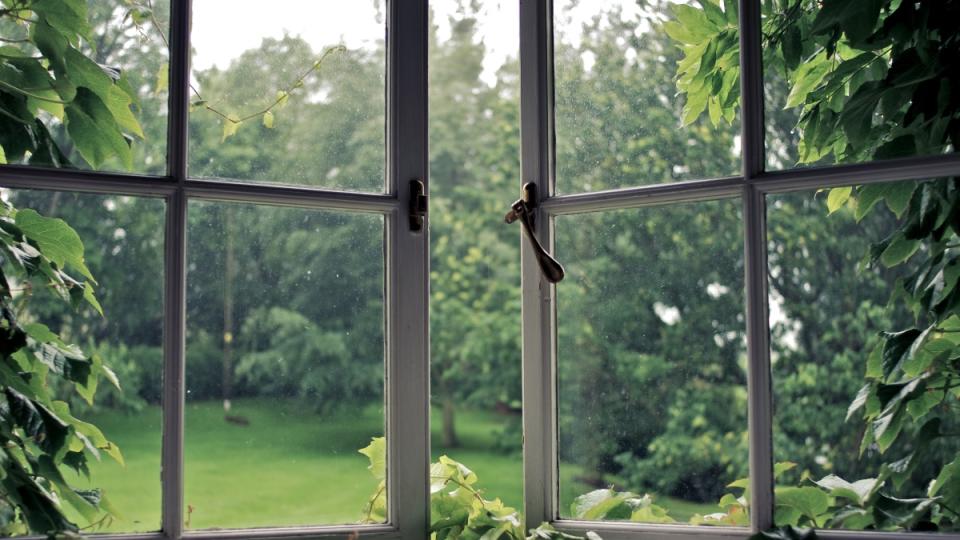Treating This Sneaky Cause of Blurriness Can Improve Your Vision in 7 Days
Find yourself squinting, rubbing your eyes, or struggling to focus due to blurriness or glare? Many of us don't realize it, but sight problems are often caused by dry eye, a condition that affects up to 54% of folks over age 40. The good news: A few simple tricks can restore much-needed moisture to your eyes and improve your vision in 7 days or less.
How your vision changes with age
Even if you had laser-like vision when you were younger, it's normal to start to struggle a little more in the sight department once you reach your 40s and beyond, explains Barrett Eubanks, MD, an ophthalmologist in Murrieta, California.
Over the years, you might experience eye aging symptoms like having a harder time seeing up close, having trouble telling the difference between similar colors (like blue vs. black), or needing more time to adjust to changing levels of light, for instance.
You're more susceptible to dry eye, too. "Dry eye is a top cause of visual fluctuation," says Roselyn Ahua, OD, FAAO, an optometrist in Concord, NC. "Often times, people are not aware of the important connection between their vision and the quality of their tear film." (Your tear film is the lubricated covering that keeps your eyes hydrated and protected.)
Many people with dry eye experience symptoms like redness, stinging, burning, sensitivity to light, or a feeling like something is in your eye — symptoms most of us are familiar with. But it turns out the problem can also make it harder to see, triggering blurred vision or blurriness upon waking.

How dry eye affects your vision
"With dry eye, the layer of tears which rests on the surface of the eye breaks up and evaporates away," Dr. Eubanks says. That can blur your vision and leave your eyes red and irritated. It can also make you more sensitive to glare, like bright sunlight or car headlights at night, says James Dello Russo, MD, an optometrist at NJ Eye Center in Bergenfield, NJ.
What's more, you might not even realize that dryness is the underlying cause. "There are some people that may not be super symptomatic, but the dry eye is still affecting the quality of their vision," Dr. Ahua adds.
Anyone can get dry eye. But menopausal women over 50 are particularly prone, according to a University of Virginia review. You can thank age-related hormone changes for that. "Many of the components of the layer of tears are regulated by hormones such as estrogen," says Dr. Eubanks. "Because of this, the eyes are at a greater risk of drying out after menopause" when your estrogen levels dip. (Click through to see how menopause can also cause dry mouth — and how to cure it.)
More common causes of dry eye:
Menopausal hormone fluctuations aren't the only dry eye trigger. These issues can raise your risk of the vision-blurring condition, too.
1. Underlying health issues
Certain health conditions that are more likely to affect older women, like rheumatoid arthritis or hypothyroidism, can cause complications such as increased inflammation that make your eyes drier. (Click through to see how aloe vera juice can nourish a sluggish thyroid.)
2. Too much screen time
Lifestyle factors, such as spending long stretches staring at a computer or smartphone, can raise the risk of dry eye. Why? We naturally blink less while we're looking at screens, Dr. Dello Russo says, which hampers the protective tear film over you eyes.

3. Dry environments
Everything from spending time outside on a cold or windy day to being cooped up indoors when the heat is running to traveling in an airline can sap moisture from not just your eyes, but your entire body.
4. Wearing contact lenses
An estimated 45 million people in America wear contacts. While the vision aids improve your sight, they can also increase dryness by partially blocking fresh oxygen from reaching the eyes.
5. Certain medications
Taking common medications such as antihistamines, decongestants, antidepressants, hormone replacement therapy, or drugs for high blood pressure, acne, or Parkinson's disease all raise of risk of developing dry eyes as a side effect. (Click through to discover the best natural nasal decongestant sprays that can replace antihistamines.)
How to improve your vision in 7 days
No matter the cause of your dry eye, restoring moisture — and your sight — is easier than you may think. These simple tricks can improve your vision in 7 days. And in most cases, you'll start to see results far sooner!
1. Use these artificial tears
Over-the-counter artificial tears are the fastest, easiest way to rehydrate dry eyes so you can see more clearly. "It's the first step in treating dry eye," Dr. Eubanks asserts. "These artificial tears can supplement our own layer of tears."
Both Dr. Eubanks and Dr. Dello Russo recommend using a preservative-free product like Refresh Optive (Buy from Amazon, $9.99) or Systane Ultra (Buy from Amazon, $18.99). The preservatives found in some artificial tears (like benzalkonium chloride or BAK) can actually irritate your eyes when you use it too often, which can end up making your dry eye worse, Dr. Dello Russo explains.
Another option: Using drops with hyaluronic acid (HA), such as Bausch + Lomb Biotrue Hydration Boost Eye Drops (Buy from Amazon, $9.98). A study in the International Journal of Environmental Research and Public Health found that using eye drops with HA helps you produce 27% more tears than saline-based drops. "It helps to increase the stability of the tear film, reduce tear evaporation, and aid in the even distribution of tears across the surface of the eye," Dr. Ahua says.

How to boost the benefit of artificial tears
Dr. Dello Russo recommends applying a few drops at least 4 times per day, including when you first wake up, before bed, and anytime you notice your eyes starting to dry out. You'll start to feel relief instantly with just a few drops. And you'll notice an even bigger improvement, like less dryness throughout the day and clearer vision, with a few weeks of regular use, Dr. Eubanks says.
And while you might be tempted to ditch the drops once your symptoms ease up, you should continue applying them a few times a day to dodge future flare ups. "People often make the mistake that dryness is there when they feel it and it's gone when they don't," Dr. Ahua says. But if you're prone to dry eye, you should use eye drops like moisturizer you apply every day. "It should be part of your regular maintenance to keep your eyes lubricated," she adds.
2. Sip more water
Another simple way to improve your vision in 7 days: Up your water intake. It sounds obvious, but many of us are chronically dehydrated. Dr. Dello Russo advises drinking at least 6 glasses of water throughout the day. A steady supply of H2O keeps all of your tissues, including your eyes, well-hydrated, making them less prone to dryness, he explains.
And to boost the benefits, add a fresh squeeze of lemon to a glass or two. It delivers natural electrolytes that replenish key minerals that keep you hydrated. Or simply stir an electrolyte mix into your drink, such as Liquid I.V. (Buy from Amazon, $23.45) (Click through to learn how electrolytes like Liquid IV aid in weight loss.)
3. Cozy up with coffee (then tea!)
Not a fan of plain water? No problem! Sipping a daily cup of coffee is a relaxing way to improve your vision in 7 days — and you'll start to notice results within an hour of your first sip. The caffeine in java stimulates glands in your eyes to produce significantly more tears in as little as 45 minutes, suggests a study in Ophthalmology.
Tip: If you're prone to dry eyes, try to swap out a second cup of coffee for caffeine-free herbal tea instead. "One cup of coffee or a glass of wine is okay," Dr. Dello Russo assures. "But caffeine and alcohol are diuretics, which can dry out your eyes," when you have them in excess. A smart trade off: Dandelion tea. The plant is rich in both lutein and zeaxanthin, two key "eye nutrients" that keep your sight sharp for years to come.

4. Run a humidifier the right way
Much like increasing your fluid intake can improve your vision in 7 days by restoring moisture, upping the humidity indoors can sharpen your sight, too. Indoor air can be drying, especially during the winter months when the heat is running. And that can irritate your eyes, Dr. Dello Russo says. To combat the desert-like climate, he recommends running a humidifier in your bedroom while you sleep or in your workspace during the day to keep your eyes hydrated and your sight clear.
Tip: Instead of setting the humidifier just beside you on your nightstand, put the device about 3 to 5 feet away, Dr. Ahua recommends. If the humidifier's airstream is too close to your eyes, it can actually disrupt your eye's tear film and potentially make your dryness worse. (Click through to see more benefits of using a humidifier.)
5. Peek out the window
Next time you're paying bills online or writing emails to help with your church's fundraiser, set a timer to take a break every 20 minutes to look at something 20 feet away for at least 20 seconds, recommends Dr. Ahua. This "20-20-20" screen rest trick, which Dr. Ahua does herself, can help lubricate your eyes. "Our blink rate decreases when we look at screens," she explains. But when we look away from the screen, "we blink more, which pumps more natural tears into your eyes."
If you can spend your break gazing at the trees or the sky, even better. Stress can worsen dry eye by increasing inflammation, which lowers your eyes' natural tear production. But just a quick look at nature can help tame the tension, research in Environmental Science & Technology suggests. (Click through to discover more health benefits of nature.)

6. Don wraparound sunglasses
You already know that sunglasses make it easier to cope with glare on a bright day. But if you're battling dry eye and vision trouble, wraparound sunglasses are your best bet. "The wraparound design is like a windshield, " Dr. Dello Russo explains. "It helps block wind and debris that can worsen dry eye." He recommends looking for lenses with 100% UVA/UVB protection, which filter out the sun's harmful rays to protect your eyes from damage. One to try: Duco Wraparound Polarized Glasses (Buy from Amazon, $19.70).
7. Try a warm compress
When your vision is blurry and your eyes are irritated, a warm compress can help. Applying gentle heat to your eyes soothes symptoms by 80% in as little as 5 minutes, Harvard scientists say. "We have oil glands along our eyelids that put oil in our eyes when we blink, which helps with tear quality," Dr. Ahua explains. "When those glands are blocked or aren't flowing efficiently, heat loosens them up."
But rather than reaching for wet washcloth, try Dr. Ahua's smart trick: Gently heat a clean tube sock filled with uncooked rice in the microwave until it's warm (but not hot) to the touch, she recommends. It'll stay warm longer than a damp washcloth, providing better vision-clearing results. Never made your own heat pack? Check out the video below for a quick how-to.
8. Take a deep breath
Sure, pausing to breathe deeply is relaxing. But it's also a soothing way to hydrate dry eyes and improve your vision in far less than 7 days. Spending just three minutes "belly breathing" boosts tear production by 48%, according to research in The Ocular Surface. This type of soothing breathing technique calms the parasympathetic nervous system that regulates the tear-producing lacrimal glands. To do: Breathe in through your nose for 4 seconds then our through your 6 seconds, allowing your stomach (rather than your chest) to rise and fall. Repeat for 3 minutes.
When to see a doctor for vision problems
Most of the time, mild vision problems or irritation caused by dry eye is easy to fix at home with one or more of the remedies above. But if your eyes are still uncomfortable, or you're still struggling to see clearly after two to three weeks, make an appointment to see your eye doctor, Dr. Dello Russo advises. Your doctor can conduct an eye exam to see if your glasses or contact lens prescription needs to be updated and screen for possible eye problems like cataracts or glaucoma that may be contributing to your vision trouble.
For more ways to improve your vision:
Marigold Extract is ‘Supreme’ for Improved Eyesight, Says Top Eye Doc — How to Reap the Benefits
Could Taking Too Much Niacin (Vitamin B3) Cause Vision Loss and Liver Damage?
Poor Night Vision? Boost Your Eyesight in Low Light With These Clever Hacks
These Antioxidant-Rich Berries Can Ward Off Age-Related Vision Loss
This content is not a substitute for professional medical advice or diagnosis. Always consult your physician before pursuing any treatment plan.
Woman's World aims to feature only the best products and services. We update when possible, but deals expire and prices can change. If you buy something via one of our links, we may earn a commission.
Questions? Reach us at [email protected]
Solve the daily Crossword

